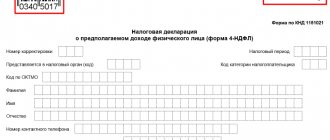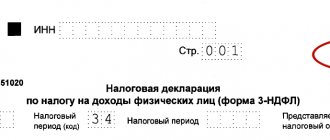One of the legal options for getting rid of debts is bankruptcy. If there are sufficient circumstances (debt of a certain size, failure to fulfill obligations to repay it and the obvious impossibility of doing so in the future), a citizen or organization may be declared bankrupt. Let us remind you that the debt, if unable to repay it within 3 months, for a legal entity must be at least 300 thousand rubles, and for individuals (including individual entrepreneurs) - 500 thousand rubles.
The initiator of the bankruptcy procedure can be the debtor himself, any of his creditors or an authorized government body. The latter is most often the Federal Tax Service of Russia. And situations where the tax office has filed for bankruptcy are happening more and more often. Please note that such applications are submitted primarily in relation to legal entities and individual entrepreneurs. With regard to “physicists”, the likelihood of such treatment is very small because Tax debt exceeding half a million rubles is extremely rare for this category of taxpayers, and tax authorities find other ways to pay it off.
Bankruptcy of legal entities by the tax inspectorate
Let us repeat once again - tax authorities can begin the insolvency procedure only a month after the court verdict. But in the case when the counterparty’s monetary obligations are not fulfilled. If we talk about legislation, then this is evidenced by government decree No. 257 of May 29, 2004, which includes the procedure for conducting bankruptcy proceedings in the interests of the Russian Federation as a creditor.
This regulatory legal act specifies a period of up to three months, according to which the Federal Tax Service needs to make a decision on filing an application with the arbitration court to initiate insolvency in relation to a certain legal entity. By the way, it should be mentioned that the main criterion for a problem debtor is the amount of three hundred thousand rubles for monetary obligations to creditors. You also need to highlight Federal Law No. 127 on bankruptcy, in which you can find a lot of useful information about this procedure regarding commercial organizations.
Who are we?
We are lawyers. Our activities are regulated by the Code of Ethics for Lawyers and the Federal Law “On Advocacy and the Bar in the Russian Federation” N 63-FZ. And this is an additional responsibility for us.
We have been working since 2003.
Our lawyers and advocates are practitioners. We represent the interests of our clients in arbitration courts, and do not just provide advice.
We have our own professional media and partner media.
More information about the Law Firm "Legal Guarantee"
We solve the problems of our clients in bankruptcy cases:
Represented the interests of the debtor, more than 16 million debts were written off. The Moscow Arbitration Court declared the debtor bankrupt
View document
Protection of the interests of a debtor-individual - in the Arbitration Court of the Omsk Region. More than 17 million rubles were written off.
View document
More than 2 million rubles were written off. debts, the principal is declared bankrupt.
View document
Recognition of the debtor's transaction as invalid (thus, the debtor intended to hide the property and reduce the bankruptcy estate). We defended the interests of the creditor and challenged the transaction of the debtor who filed for bankruptcy. The bankruptcy estate included the amount for the invalidated transaction of RUB 7,630,055.00.
View document
Protection of the former director of a bankrupt legal entity from subsidiary liability. We were able to defend the interests of the principal and prove that he is not a controlling person of the bankrupt debtor.
View document
Do you need competent advice from a bankruptcy lawyer?
Leave your number, we will analyze your prospects for getting rid of debts.
How can we help you:
| Consultation with a lawyer on bankruptcy initiated by the tax authority |
| Developing an individual strategy and tactics in a situation where the tax office has filed for bankruptcy |
| Supporting the bankruptcy procedure of an individual |
| Supporting the bankruptcy procedure of a legal entity |
| Supporting the bankruptcy procedure of individual entrepreneurs |
| Protecting the interests of the principal in the event of bringing the tax authorities to subsidiary liability |
| Defense in criminal cases of any complexity |
| Representation in an arbitration court in a bankruptcy case by a tax authority |
| Comprehensive legal services for legal entities |
Bankruptcy of legal entities with debts to the tax authorities
The Federal Tax Service has all the powers of the executive branch of the Russian Federation, so the tax authority can collect all the information about the obligatory payments of the debtor, for example, to the Social Insurance Fund and the Pension Fund. The amount owed above also applies to payments to these authorities. When the tax service files a claim for the insolvency of a company due to non-payment of taxes, it also needs to inform the FSS and the Pension Fund of the Russian Federation about this fact. Upon her request, these government agencies must provide data on the amount of obligations of a certain company to them. Please take this information into account when you contact the Federal Tax Service.
Next, tax authorities combine the information received from organizations and send it to arbitration, which already includes the debt beneficiaries in the list of claims. Experienced lawyers say that if a legal entity has not paid mandatory payments in the amount of more than three hundred thousand rubles within 90 days, then the tax service, in accordance with the law, is obliged to file a claim for the insolvency of a commercial organization.
By the way, for information - for an individual entrepreneur, the amount of debt at which the Federal Tax Service initiates bankruptcy of an entrepreneur is at least half a million rubles. Also, the reason for carrying out this procedure may be non-payment of tax payments as an agent. This is reflected in the comments of the Supreme Court which clarify this aspect. But, as experts say, this is a right, not a responsibility of tax officials.
Required documents
To file for bankruptcy, an entrepreneur needs to collect an impressive set of documents:
- Application for recognition of the financial insolvency of an individual.
- Citizen's personal documents : passport, TIN, SNILS.
- Documents on marital status : certificate of marriage or divorce, birth of children, marriage contract on division of property.
- Documents regarding the income of an individual, if in parallel with the individual entrepreneur he was officially employed : certificate 2-NDFL.
- Documents on concluded transactions regarding property worth more than 300 thousand rubles. in the last three years before the bankruptcy procedure.
- Inventory of creditors , in which the debtor lists how much he owes and to whom.
- Inventory of property , savings and open bank accounts.
- Documents confirming the existence of debt : tax claims, demands of extra-budgetary funds for payment of debt, loan agreements, supply agreements, etc.
- Receipt with paid state duty in the amount of 300 rubles.
- A receipt or other payment document confirming payment of RUB 25,000. to the court's deposit for the manager's remuneration .
- Copies of the receipt for sending registered letters , which confirm the fact that the application was sent to the debtor’s creditors.
The tax office files for bankruptcy of a legal entity
In this case, the Federal Tax Service relies on government resolution No. 257. It indicates that the fiscal authorities can file a claim for the insolvency of a company in a judicial body no later than three months from the date the bailiff service receives an arbitration decision on the implementation of requirements for the payment of mandatory payments based on the property of a willful defaulter.
The tax service is obliged to initiate bankruptcy no later than five working days from the date of the resolution on this issue. But, as the Supreme Court points out, these are not mandatory deadlines, and they have meaning, most likely of an organizational nature. Let us explain - if the Federal Tax Service “forgot” about ninety days, then this will not prevent it from further initiating bankruptcy of a certain company.
Tax audit in case of bankruptcy of a legal entity
Commercial organizations are planning to undergo insolvency proceedings in order to resolve issues related to the conduct of their activities. It is believed that this is also a good way to avoid coming to the attention of the fiscal authorities, since tax authorities most often do not like to carry out audits of pre-bankrupt companies - in this case, collecting debt on mandatory payments from them seems unlikely.
But there are exceptions when the Federal Tax Service still orders inspections, since in accordance with the law it can carry out audits of companies with economic problems. But in what cases can tax officials still come to the management of companies? Several factors must come together here. Let's move on to analyzing this situation.
How does the tax office behave in the event of bankruptcy of legal entities?
Once the fiscal authority learns that a commercial organization has filed an application for insolvency status, it needs to decide to conduct an audit against this company. But in general, the capabilities of the Federal Tax Service are limited, since it is a third-priority creditor, which means that it will have little motivation to check the future bankrupt. A meeting of debt beneficiaries also cannot help the tax authority somehow influence the debtor legal entity.
What are the tax procedures for bankruptcy of legal entities?
can participate? It must be said that financial claims from the Federal Tax Service are often not included in the list of beneficiaries of debts during insolvency proceedings. This means that the possibility of receiving tax revenues from a pre-bankrupt payer is reduced. This is due to the fact that fiscal workers do not meet the deadlines for submitting financial claims so that they are taken into account by the arbitration court. In order not to worsen their statistics on the collection of tax payments, specialists can, after some time, cancel the audit of a legal entity that was previously assigned. But, if you answer the above question about the procedure, then this can only be used at the stage of bankruptcy proceedings.
When a company continues to operate, fulfilling its financial obligations for payments, and is at the stages of restructuring its activities, such audits can be fully carried out by the Federal Tax Service. Every leader of his or her organization needs to learn this.
In addition, when a commercial organization goes through bankruptcy proceedings and it turns out that it has a large debt on mandatory payments to the tax authorities, this increases the likelihood of a desk audit by the service. In another case, as already written, this will be unlikely, since the Federal Tax Service lacks much motivation.
Another way to prevent the tax authorities from coming to you is that you can also hold an event similar to closing a business. In this case, we mean such a procedure as the reorganization of an enterprise.
When does the tax authority have the right to suspend the submission of an application?
What other steps can a company take to protect its interests?
Appealing the decision of the tax authority, which led to the emergence of a disputed debt, or appealing the actions of the tax authorities, due to which signs of bankruptcy appeared, can help to suspend the filing of the application for two months.
In this situation, the Federal Tax Service takes into account:
- the reality of restoring the debtor's solvency within this period,
- whether he has sufficient liquid assets. Therefore, if there is a threat that bankruptcy will be filed by the tax authorities, the debtor must take all possible measures: try to get a deferment or installment plan for the payment of taxes and contributions, prove in court that he has a real opportunity to pay off this debt, appeal the decisions of the tax authorities on inspections that resulted in the occurrence of overdue debts.
What inspection deadlines does the tax office set during bankruptcy procedures for legal entities?
In accordance with the regulatory legal acts of the Russian Federation, the audit activities of the fiscal authority are carried out within two months, in extreme cases - three months. If we talk about normal practice, then deadlines may be added due to some suspensions of the verification process. Also, fiscal workers have the right to draw up a document including audit details within sixty days. This act will be shown to the payer, who can also appeal it within two months. These are important timing clarifications that should not be forgotten.
If you count the time from the initial period of audit activity to the execution of the decision on payment of mandatory payments, then a period of at least six months can pass, but in practice much longer.
But it must be said that usually tax authorities will be included in the register of creditors only when no more than thirty days have passed since the publication of a message about the insolvency of the debtor commercial organization in the media. Only in this case can the Federal Tax Service participate in the selection of a financial specialist as an intermediary between creditors and the defaulter, and also influence the establishment of a specific insolvency procedure.
In what cases can the Federal Tax Service launch an inspection against a debtor?
One of the main indicators of the successful work of the Federal Tax Service is the regular receipt of funds from taxpayers to the federal budget. If an organization or entrepreneur violates tax payment deadlines, this may be a reason for an audit.
In practice, the Federal Tax Service initiates an audit if the following circumstances exist:
- from the presented reports it is clear that the company’s activities have been unprofitable for at least two periods;
- the average salary of employees has decreased compared to similar organizations;
- the company decides to quickly reorganize or liquidate;
- a company or entrepreneur often changes tax office without good reason;
- There are large gaps between payments to the budget that are not typical for the type of activity of the company;
- the taxpayer ignores the requirements of the Federal Tax Service;
- the presence of shell companies among counterparties.
If the Federal Tax Service identifies several signs at once in an organization or entrepreneur, this will trigger an unscheduled inspection.
How is a tax audit carried out in the event of bankruptcy of legal entities?
Such an audit is carried out in accordance with the Tax Code, as indicated by Article 88. To carry it out, the permission of the heads of a commercial organization or the Federal Tax Service is not required. During the audit process, the company's financial documents are analyzed. If necessary, tax officers may require explanations, for example, regarding the balance sheet. You should also expect that they will request other documents to analyze the taxpayer's situation.
All requests from the fiscal authority regarding discrepancies found in accounting must be satisfied within five days when the commercial organization received these notices.
When a legal entity undergoes bankruptcy of legal entities by the tax inspectorate
, the Federal Tax Service may involve third parties who will help audit the position of the enterprise. At the same time, the person being checked may not find out about this until he receives a document with the data obtained during the analysis of the company.
Bankruptcy lawyers: why their help is necessary
We at the Legal Guarantee Law Office specialize in turnkey bankruptcy for both individuals and legal entities. At the same time, we take cases at any stage.
Even when it comes to initiating a criminal case, we are ready to offer legal assistance. Criminal defense in economic crimes, business protection from criminal prosecution - we will help you!
Price for bankruptcy services:
For individuals - from 120 thousand rubles (or 10 thousand/month, installment plan applies) For legal entities - from 200 thousand rubles.
Order
How does a desk audit take place in case of insolvency of a legal entity?
It is carried out on the territory of the fiscal authority, that is, employees do not travel to the site of the debtor company. In this case, tax authorities analyze the documents provided by the enterprise and, if necessary, clarify the information with the debtor.
But how can a taxpayer avoid this procedure? Several factors must come together here. Firstly, the company always submitted its reports on time, which indicates its responsible attitude. Secondly, she did not have receivables and payables. Thirdly, the company provided the Federal Tax Service with a report with a zero balance. Fourthly, a legal entity has one owner, that is, a founder. And lastly, the bankrupt company has not carried out work for three years.
How is a tax audit carried out in case of bankruptcy of legal entities on the site of the enterprise?
If we talk about laws, they do not provide for an on-site audit, since by inspection we mean such a procedure on the site of a commercial organization. For this to happen, you must obtain permission from the head of the fiscal authority. At the same time, the top management of the debtor company or the financial manager must assist tax employees in their work on the territory of the enterprise so that they can properly inspect and analyze financial documents. By the way, the debtor also has the right to be provided with witnesses during the inspection and seizure of documentation. This information can be very useful for financial managers of a commercial organization - take it into account.
The question arises, what will happen to the audit when, during the implementation process, the debtor company begins to undergo insolvency proceedings? The verification will take place as stated in accordance with the law, but now the requirements of the Federal Tax Service will be satisfied only after the latter are included in the list of creditors.
Is control exercised by tax authorities when an enterprise goes through bankruptcy?
As already indicated, fiscal authorities audit the company as usual, even during the process of obtaining insolvency status. Also, during this procedure, the top management of the enterprise no longer participates in the management of the company - now this is the prerogative of the arbitration manager. Therefore, the Federal Tax Service sends its requests for new data only through it in accordance with Russian legislation. It is the court that appoints this specialist and determines his powers.
Since mandatory tax payments are third priority claims, it is very unlikely that the company will satisfy these claims. Therefore, after the sale of the enterprise’s property, its debts will be considered repaid. But the Federal Tax Service can try to solve this problem in the following way.
She can sue the managers and owners of a problematic commercial organization so that they can be held vicariously liable. Especially if it turns out that it was a deliberate bankruptcy. Because unwillingness to pay taxes in our country is a criminal offense. When the fiscal audit ends, a report on tax violations is created, after which the Federal Tax Service decides to bring the debtor to additional payment of tax payments, and if the company does not do this, then the tax authorities transfer the case to the Ministry of Internal Affairs, which can already bring the top management to criminal liability and initiate a case in their regard.
What do the results of an audit by the tax service include?
At the end of the audit, the tax service may point out to the bankrupt company some violations that are usually encountered during the analysis of financial documentation. The absence of errors is usually not encountered often in practice.
Next, the Federal Tax Service draws up a document on the violations found and presents this report to the debtor. The company has the right to file a complaint with arbitration, but if this is not done, the fiscal authority will then demand payment of arrears on mandatory payments. But, when it comes to a legal entity that is going through insolvency proceedings, it may require that unpaid tax debts be included in the list of claims of the beneficiaries of the debt. At the same time, the tax office must have time to file a lawsuit to include its organization in the register of bankruptcy creditors.
The Federal Tax Service files for bankruptcy of the company: what to do
Experts note that the fiscal service can use some methods to receive arrears on tax payments. For example, she carries out an audit in the territory of a potential bankrupt, after which she finds facts that the company received unjustified tax profits. Next, the tax office files a claim with arbitration so that it declares the company insolvent, and also holds the top management of the enterprise to additional responsibility for the financial obligations of the problematic commercial organization. This scheme, according to lawyers, has been increasingly used lately. Perhaps this information will be useful to managers and owners of companies going through insolvency proceedings.
Therefore, we can say that with this method, the Federal Tax Service plays proactively so that some payers of taxes and fees cannot file for bankruptcy during the implementation of the fiscal audit and assist the tax authorities in this procedure. Since the disagreement of companies, obviously, forms a certain judicial practice in favor of the latter. Next, we will consider a specific procedure on the part of the Federal Tax Service, which every head of an enterprise should know in order to prevent the risk of bankruptcy on the part of the tax service.
Let's look at the following sequence that the service carries out when interacting with a commercial organization:
- The fiscal authority warns the enterprise that it will conduct an audit on the territory of the enterprise. The purpose of a tax audit is to identify unjustified tax benefits, after which the Federal Tax Service will hold the company's owners administratively and criminally liable if they do not pay off the debt on mandatory payments within a short period of time;
- Next, the tax authorities decide to involve the tax payer in paying additional arrears as an additional charge after the audit. In this case, this decision must be approved by arbitration of the first or second instance;
- The Federal Tax Service issues a demand for repayment of the debt and, if necessary, turns to the bailiff service to collect the debt;
- After this, the tax authorities file a claim in court for bankruptcy of the legal entity;
- At the same time, another lawsuit brings top management and business owners to vicarious liability.
The YurlexProf company can help you go through bankruptcy on your terms, so that debts on obligatory payments are written off as much as possible. Our professional lawyers have extensive experience and will do everything to ensure that your problem is resolved in the shortest possible time. Order the service now, and the debtor’s life will begin from a new point without large financial obligations.
Who most often falls into tax debt?
The list of tax debtors primarily includes persons who have problems repaying their loans. Losing a job while under mortgage obligations leads to the rapid formation of debt and this situation is rarely resolved favorably for the borrower.
The second category of debtors are bankrupt entrepreneurs. An unprofitable business generates large debts to organizations, banks, the Federal Tax Service, and extra-budgetary funds. At the same time, tax debts not related to commercial activities are growing.
The third category is people with a low degree of responsibility. They don't pay taxes and utility bills without good reason.
If the taxpayer does not transfer the required amount, the Federal Tax Service makes a recovery in court, within the limits of the amounts specified in the request.










